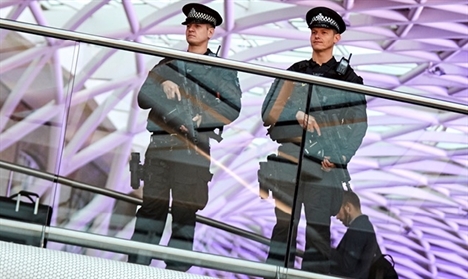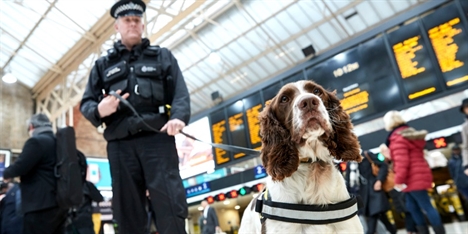09.03.17
Tackling the ever-growing terrorist threat
Source: RTM Feb/Mar 17
RTM talks to Assistant Chief Constable (ACC) Alun Thomas, the lead for counter-terrorism at British Transport Police (BTP), about how the force is tackling the growing threat from terrorism.
At BTP, the job is to keep the millions of people travelling and working on the railways every day safe from harm.
It is a police force like no other, with specialist units trained to deal with crime and danger in the unique and challenging railway environment.
Counter-terrorism at BTP is a big part of its day-to-day work, but it’s not a separate area of policing – it feeds into everything BTP do. This is because every officer and staff member in the force plays a part in remaining vigilant and keeping everyone safe from the threat of terrorism.
It also works with the public and partners in the rail industry to ensure that everyone is alert, without being alarmed.
ACC Alun Thomas, the lead for counter-terrorism at BTP, said: “The memories of the July 2005 attacks are never far from our thoughts at BTP, and we are acutely aware of the responsibility we have to prevent and protect another travesty of that nature.
“We are investing heavily in our counter-terrorism response and ensuring that the public and rail staff are fully equipped to do their bit too, because communities defeat terrorism.
“Of course we don’t expect rail staff or the public to decide, for example, whether or not a suspicious item that they notice is terrorism-related. That’s our job. We have a number of expert units trained to work in the challenging railway environment, but it is vital that people report things to us whenever something doesn’t feel right.”
The BTP Specialist Response Unit (SRU) is one such team, made up of highly-skilled officers who respond to reports of suspicious and unusual items on the railway and Underground network that could be terrorist-related, whilst minimising disruption to passengers.
This is a unique role. BTP is the only UK police force which has a dedicated, fully-trained and equipped team, operating around the clock for the purpose of assessing threats in this way. As well as dealing with unattended items, SRU officers are also trained and equipped to deal with chemical, biological and radiological threats.
The SRU officers have all the skills of a response police officer but also undertake additional, intensive training for this specialist role. Their training and experience means they are ideally equipped to work in the railway environment, which presents its own distinctive challenges.

Project Servator
It’s not just about people; even our four-legged friends have a part to play in the fight against terrorism. BTP’s dog unit was named Dog Section of the Year 2016 by the Worshipful Society of Security Professionals for their outstanding contribution to the protection and safety of the travelling public and response to an ever-growing and changing terrorist threat.
The dogs and their handlers take part in Project Servator deployments, which members of the public may well have seen at railway stations across the country in the past year. Project Servator, which is now being adopted across the UK by other police forces, is unpredictable and highly visible. Its aim is to deter crime before it happens, by detecting where it might be taking place and stepping in to stop it.
The deployments could include armed officers, dogs, behavioural detection officers or high-profile uniformed cops – and they could pop up anywhere, at any time.
In the past year, there have been more than 400 deployments across the network – from Glasgow and Edinburgh to Leeds, London, York and Cardiff.
ACC Thomas said: “There is no doubt that the increased threat from terrorism has changed the way we police the railway and I’m sure that our fellow police forces around the country have seen great changes in the way they work in recent years too. Counter-terrorism is one of our key objectives for BTP and we are continually working to raise awareness within the force, our stakeholders and the public.

“We take part in events like Counter-Terrorism Awareness Week with activities across the UK and on social media to tell the public about how we work to keep them safe and how they can help.
“Last year saw the launch of the ‘See it, Say it, Sorted’ campaign, created in partnership with the DfT and the rail industry, in which we ask rail passengers and staff to help keep themselves and others safe by reporting unusual items or activity on the railway.
“At BTP we also provide training to rail staff through Project Griffin, a national initiative which aims to make sure staff feel enabled to recognise and report suspicious activity and guide them on what to do if they were ever to find themselves involved in an incident.
“Throughout last year, our specialist advisors ran more than 200 free sessions, reaching more than 3,400 people from a range of industry partners and business across the UK – including in Glasgow, Sheffield, Cardiff, Bristol, Leeds and Manchester.
“The Project Griffin sessions are a really valuable way of building partnerships with staff across the industry and other businesses. It’s all about the police, rail staff and public co-operating and nobody should worry about wasting our time – it’s better to trust your instinct and contact us if you feel something isn’t right. No piece of information is considered too small or insignificant and we rely heavily on passengers and staff to be our eyes and ears.”
The sessions include topics such as possible methods of attack and aim to raise awareness of terrorism, build effective working relationships and empower people to report suspicious activity.
Things to look out for include someone being somewhere they shouldn’t be, for example, trying to get through a door marked ‘no entry’; an unattended bag; or someone checking security arrangements, for instance filming CCTV cameras at a station, or someone avoiding rail staff and police officers.
ACC Thomas added: “Despite the focus on counter-terrorism, which is obviously a very serious, dangerous and at times incredibly sad subject, our officers are still the friendly, approachable and positive policemen and women that the public are used to seeing as they travel on the railway.
“We are still there to deal with everyday policing matters, to interact with the public, and to make sure everyone gets home safely.
“If anyone would like to find out more about BTP’s work and our counter-terrorism initiatives, I would encourage you to speak to our officers when they are out and about in stations, or to visit our social media pages and our website where there is information on everything BTP.”
© BTP
FOR MORE INFORMATION
W: www.btp.police.uk
Tell us what you think – have your say below or email [email protected]